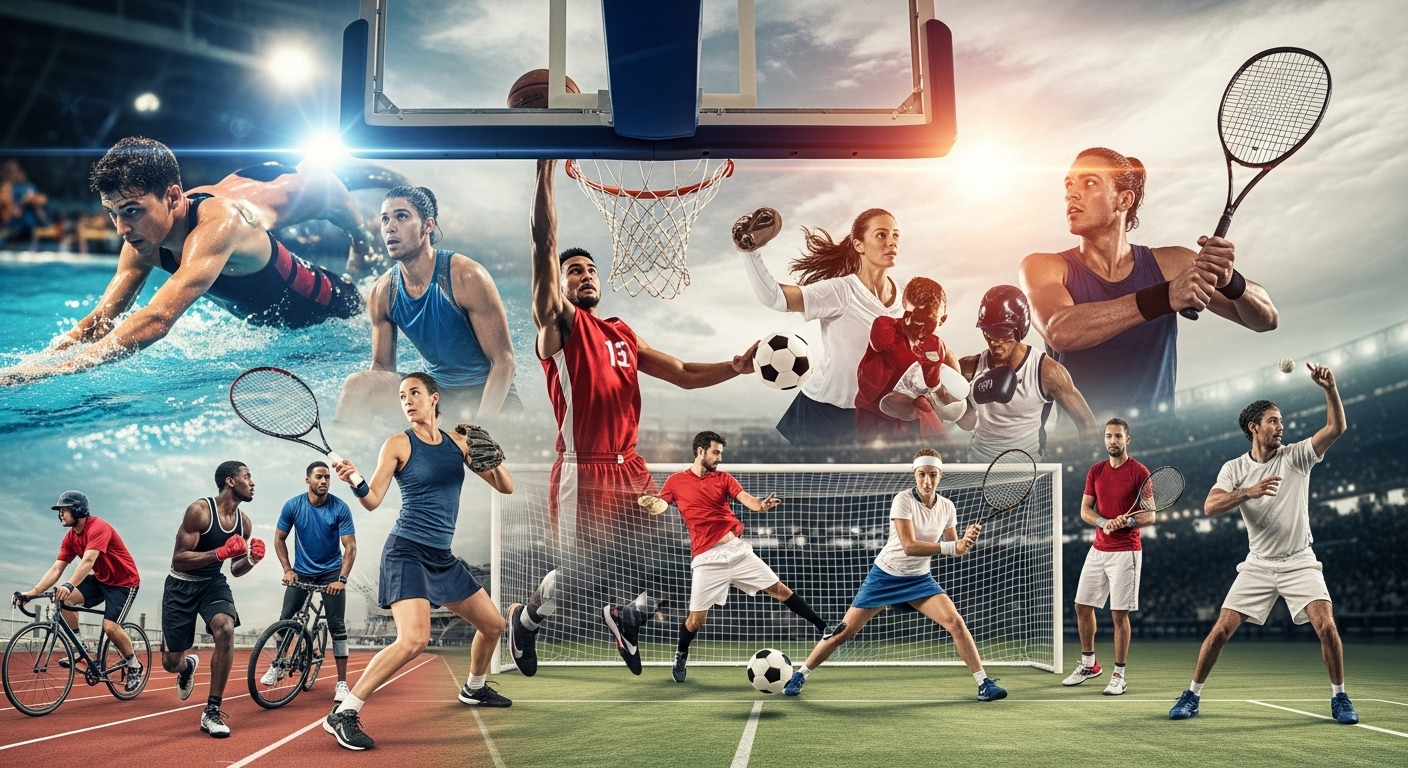Sports have always been more than just games played on a field or court. They hold the power to inspire, unite, and shape lives in ways few other activities can. Whether it’s the excitement of a last-minute goal, the discipline required for training, or the camaraderie forged in a locker room, sports have a profound effect on individuals and communities alike. In this blog post, we will explore how sports influence personal development, impact communities, and play a significant role in shaping cultures worldwide.
The Personal Impact of Sports: Building Character and Resilience
For athletes, sports are often a journey of self-discovery and growth. The physical and mental challenges that come with training, competition, and setbacks help develop important life skills, such as discipline, perseverance, and time management. The very nature of sports requires players to push beyond their limits and face adversity, teaching them how to handle failure and success with grace.
One of the most significant personal benefits of sports is the development of resilience. Athletes learn that failure is not the end but a step toward improvement. Whether it’s recovering from an injury, bouncing back after a tough loss, or improving technique, sports provide valuable lessons in resilience and determination. These qualities often extend beyond the playing field, influencing how athletes approach challenges in their personal and professional lives.
Moreover, sports can also boost mental health. The sense of achievement from hitting personal milestones, the thrill of competing, and the social connections formed through team sports all contribute to emotional well-being. Studies show that regular participation in sports can reduce stress, anxiety, and symptoms of depression, proving that sports are not just physically beneficial but mentally therapeutic as well.
The Role of Sports in Building Communities
Sports bring people together in ways that few other activities can. Whether it’s a local neighborhood soccer game, a regional basketball tournament, or a national championship, sports create a sense of belonging and community. For fans, sports offer a common ground—a shared language—that transcends age, gender, race, and background. The collective energy of cheering for a team or player fosters a sense of unity and pride, which can strengthen community ties.
At the grassroots level, sports can have an even more profound impact. Local sports leagues and recreational teams provide opportunities for people to connect with their neighbors, build friendships, and develop a sense of community ownership. These activities give individuals the chance to engage in something larger than themselves, whether through playing or supporting local teams. They help foster social cohesion by bridging divides and promoting inclusivity.
For communities facing economic or social challenges, sports can serve as a vehicle for positive change. Youth sports programs, for example, can provide mentorship, structure, and a safe environment for young people to grow. Coaches become role models, teaching valuable life skills such as teamwork, respect, and responsibility. In areas where resources may be limited, sports offer a way to channel energy and focus, often offering kids an escape from difficult circumstances and a potential pathway to future success.
Sports as a Cultural Force: Reflecting and Shaping Society
Sports are not just a reflection of a culture—they also have the power to shape societal norms and values. The way a society views sports can reveal a lot about its priorities. For instance, countries with strong traditions in certain sports often express national pride through their athletic achievements. Countries like Brazil with football (soccer), Japan with baseball, or India with cricket showcase how deeply sports are intertwined with national identity.
Sports also have the ability to break barriers and challenge cultural norms. The inclusion of women in sports has been one of the most powerful societal shifts in recent decades. Women’s sports leagues, Olympic events, and professional athletes like Serena Williams, Megan Rapinoe, and Simone Biles have not only advanced gender equality but also changed the way women are perceived in society. The representation of women in sports is now celebrated, and these athletes inspire future generations to break stereotypes and pursue their passions, regardless of societal expectations.
Similarly, sports can serve as a platform for social justice and activism. Athletes like Muhammad Ali, Jackie Robinson, and Colin Kaepernick have used their visibility and influence to bring attention to racial inequality and advocate for change. Sports, therefore, are not just about physical contests—they are also about using the global stage to challenge societal issues, provoke thought, and encourage progress.
The Globalization of Sports: Connecting the World
In the 21st century, sports have become a truly global phenomenon. With the advancement of media and communication technologies, sporting events now reach millions of people across the globe. The Olympics, the FIFA World Cup, the Tour de France, and other international competitions bring together athletes from diverse backgrounds to compete for the ultimate prize—uniting nations in friendly rivalry and celebration.
The globalization of sports has also led to the spread of sports cultures around the world. Football, for instance, has transcended its origins in Europe and South America to become the world’s most popular sport, played and followed by millions in Africa, Asia, and North America. Similarly, basketball’s rise in global popularity has been fueled by the NBA’s international reach, with stars like Yao Ming and Giannis Antetokounmpo representing countries far from the league’s American roots.
In addition to the worldwide appeal of major sports, globalization has also made it easier for athletes to connect with fans in ways that were previously unimaginable. Social media platforms allow fans to follow their favorite players, get instant updates on games, and interact with athletes in real time. This has transformed the traditional fan-athlete relationship, making it more personal and interactive, and bringing people closer to the action.
The Future of Sports: Innovation and Evolution
As technology continues to evolve, so too does the landscape of sports. From virtual reality (VR) and augmented reality (AR) experiences to advancements in sports science and medicine, innovation is constantly reshaping how we play, watch, and experience sports. One of the most exciting developments is the rise of eSports, a digital arena where professional video gamers compete for large audiences and substantial prize money. While some may question whether eSports can be classified as “traditional” sports, it is clear that this new genre is rapidly gaining ground and captivating a global fan base.
Furthermore, the incorporation of AI and machine learning into coaching, training, and injury prevention is revolutionizing athlete performance. Wearable technology is now used to monitor an athlete’s physical condition, ensuring optimal performance and reducing the risk of injuries. This technological evolution not only benefits athletes but also enhances the viewing experience, with fans now able to access real-time statistics and immersive content during live events.
The future of sports will also likely see an increased focus on inclusivity. Adaptive sports for athletes with disabilities, women’s sports leagues, and greater representation of underrepresented communities will continue to expand, ensuring that sports remain a place where everyone can compete, regardless of their background or circumstances.
Conclusion: The Enduring Power of Sports
From shaping individual character to building stronger communities and challenging societal norms, sports continue to have a profound impact on the world. They transcend borders, bring people together, and provide a platform for personal and social expression. Whether through the discipline of training, the thrill of competition, or the unity that comes from supporting a team, sports will always be a powerful force in our lives.
As sports continue to evolve, one thing is certain: their ability to inspire, unite, and shape the human experience will remain as strong as ever. The world of sports is much more than a game; it is a reflection of who we are and who we aspire to be.



